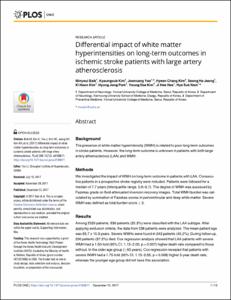Differential impact of white matter hyperintensities on long-term outcomes in ischemic stroke patients with large artery atherosclerosis
- Keimyung Author(s)
- Yoo, Joon Sang
- Department
- Dept. of Neurology (신경과학)
- Journal Title
- PloS One
- Issued Date
- 2017
- Volume
- 12
- Issue
- 12
- Abstract
- BACKGROUND: The presence of white matter hyperintensity (WMH) is related to poor long-term outcomes in stroke patients. However, the long-term outcome is unknown in patients with both large artery atherosclerosis (LAA) and WMH.
METHODS:
We investigated the impact of WMH on long-term outcome in patients with LAA. Consecutive patients in a prospective stroke registry were included. Patients were followed for a median of 7.7 years (interquartile range, 5.6-9.7). The degree of WMH was assessed by Fazekas grade on fluid-attenuated inversion recovery images. Total WMH burden was calculated by summation of Fazekas scores in periventricular and deep white matter. Severe WMH was defined as total burden score ≥ 3.
RESULTS:
Among 2529 patients, 639 patients (25.3%) were classified with the LAA subtype. After applying exclusion criteria, the data from 538 patients were analyzed. The mean patient age was 65.7 ± 10.3 years. Severe WMHs were found in 243 patients (45.2%). During follow-up, 200 patients (37.2%) died. Cox regression analysis showed that LAA patients with severe WMH had a 1.50-fold (95% CI, 1.12-2.00, p = 0.007) higher death rate compared to those without. In the older age group (≥65 years), Cox regression revealed that patients with severe WMH had a 1.75-fold (95% CI, 1.15-2.65, p = 0.008) higher 5-year death rate, whereas the younger age group did not have this association.
CONCLUSION:
The degree of WMH might be a surrogate marker for long-term outcome in patients with LAA. Atherosclerotic burdens in both small and large arteries might impact long-term prognosis in ischemic stroke patients.
- Keimyung Author(s)(Kor)
- 유준상
- Publisher
- School of Medicine (의과대학)
- Citation
- Minyoul Baik et al. (2017). Differential impact of white matter hyperintensities on long-term outcomes in ischemic stroke patients with large artery atherosclerosis. PloS One, 12(12), e0189611–e0189611. doi: 10.1371/journal.pone.0189611
- Type
- Article
- ISSN
- 1932-6203
- Appears in Collections:
- 1. School of Medicine (의과대학) > Dept. of Neurology (신경과학)
- 파일 목록
-
-
Download
 oak-2018-0384.pdf
기타 데이터 / 3.45 MB / Adobe PDF
oak-2018-0384.pdf
기타 데이터 / 3.45 MB / Adobe PDF
-
Items in Repository are protected by copyright, with all rights reserved, unless otherwise indicated.